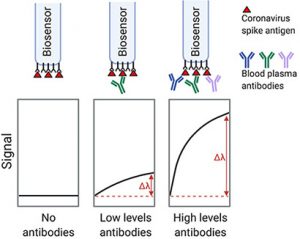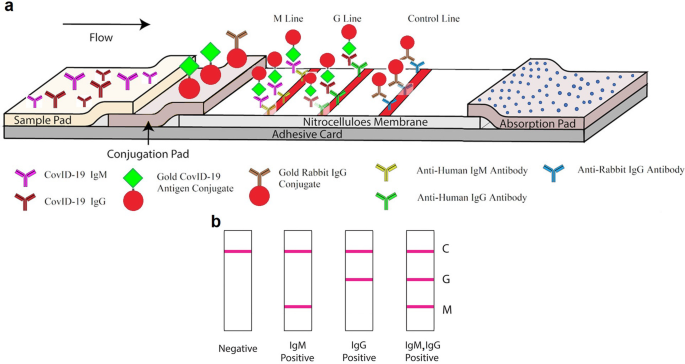Introduction to Serology
Serological rapid tests are used to detect antibodies in the blood to diagnose an active or previous infection, or to determine diseases of the immune system, such as an autoimmune disorder. There are several types of serological tests, each to diagnose a different disease; some include anti-streptolysin-O, rheumatic factor, syphilis, and CRP.
Profits
- Cost savings with excellent stability – stable until expiration date when stored at 2°C to 8°C
- Convenience with ready-to-use liquid reagents
- Wide measurement ranges for accurate detection of abnormal levels
- Excellent correlation with standard methods
- Variety of kit sizes offering suitability for all laboratories
- Controls and calibrators are available to complement each assay, as well as applications for a wide variety of analyzers.
Antibodies allow identification of past or present infections
Antibodies are formed by the body in response to infection against foreign proteins called antigens. Antigens enter the body through the mouth, nasal passages, or through broken skin. In doing so, the body’s immune system defends it by producing antibodies, particles that attach to antigens to deactivate them. Serological tests identify the type of antibodies and antigens present in the blood and determine the type of infection the patient may have or had in the past. Serology tests can also determine immunity to a certain organism.
Serological tests include:
1. Antistreptolysin O was used to determine a recent streptococcal infection caused by streptococcus bacteria. Infections can be mild or severe, and range from throat infections, cellulitis, sinusitis, impetigo, and middle ear infections to life-threatening blood or organ infections such as pneumonia, meningitis, and sepsis. Additionally, this test also helps identify the presence of post-strep complications, including rheumatic fever, which causes inflammation of the joints or heart, and glomerulonephritis, which refers to damage to the glomeruli (tiny filters in the kidneys). The latter are rare and are caused by the body’s immune system attacking healthy body tissue in response to the strep bacteria.

2. CRP is used to detect inflammation, infection, and tissue damage in the liver. CRP (C-reactive protein) is a protein produced by the liver in response to inflammation, infection, and tissue damage; it is released into the blood within a few hours and therefore the CRP test allows rapid detection of trauma or infection. It can be used in conjunction with consideration of signs and symptoms to diagnose the condition causing the infection or inflammation, as well as being helpful in monitoring treatment for people with chronic inflammatory conditions.
3. Rheumatoid factor is used to help diagnose rheumatoid arthritis and distinguish it from other forms of arthritis or conditions that cause similar symptoms. Rheumatoid factors are antibodies produced by the body’s immune system that can attack healthy tissue in the body. Symptoms of rheumatoid arthritis include joint pain, stiffness (particularly in the morning), swelling, warmth, and redness.
4. Syphilis (RPR and TPHA) is used to detect the bacterium Treponema pallidum that causes syphilis, a chronic, contagious and often congenital venereal disease. The 2 types of tests we use include Rapid Plasma Reagin (RPR) and T. pallidum Particle Agglutination Assay (TPHA).
5. RPR is a nontreponemal antibody test that detects antibodies not specifically directed against the bacterium Treponema pallidum; these are produced by the body in response to various conditions, including syphilis, and are therefore non-specific. However, these tests are very sensitive and the RPR test can also be used to monitor syphilis treatment.
6. The TPHA test is a treponemal antibody test used to detect antibodies directed specifically against the bacterium Treponema pallidum; these are highly specific for the detection of syphilis.
7. Treponemal (syphilis-specific) antibodies remain in the blood for life, whereas non-treponemal (non-syphilis-specific) antibodies are usually cleared from the blood after approx. 3 years after successful treatment; therefore, after a positive treponemal test result, a nontreponemal antibody test can be used to determine between an active syphilis infection/reinfection or a past infection that has been successfully treated.
Rapid tests include:
Randox pregnancy test used for early confirmation of pregnancy by identifying human chorionic gonadotropin (hCG) in urine; hCG is a hormone released by cells in a developing placenta shortly after conception. hCG levels are detectable in the urine in the first week after conception, making it an excellent marker for early confirmation of pregnancy.
The Randox Pregnancy Test is highly sensitive, capable of detecting hCG concentrations as low as 25mIU/ml and producing results in 3 minutes. In addition, a variety of kit methods and sizes provide options and enhance suitability.

